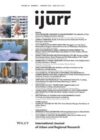How can informal settlements become regularized? Informal settlements constructed by their own residents beyond the reach of formal state planning often exist in legal uncertainty. In 2016, Argentina’s right-wing government partnered with a left-leaning social movement and two NGOs to recognize informal neighborhoods and develop a national urban upgrading policy. I draw on participant observation, 150 interviews and archival research to study how social movements use their ability to ‘see’ and produce knowledge about hard-to-measure populations to negotiate with the state the integration of these neighborhoods. I study the collaboration between civil society organizations and the state in a context of mutual mistrust. I show that social movements leverage their ‘capillary knowledge’ to negotiate the coproduction of public policies. In this case, state and civil society actors with competing political agendas engage in a form of ‘pragmatic coproduction’ to advance an urban reform that recognizes a historically neglected population. Moreover, the exchange of resources and public policies for generating data does not lead to cooptation. Instead, it empowers the social movement, enabling it to amplify its demands. My findings contain broader implications for cases where civil society organizations fulfill a key role in making populations legible.
Details
Written by:
Alejandra Cueto
Digital Object Identifier (DOI)
https://doi.org/10.1111/1468-2427.70034
About DOI
